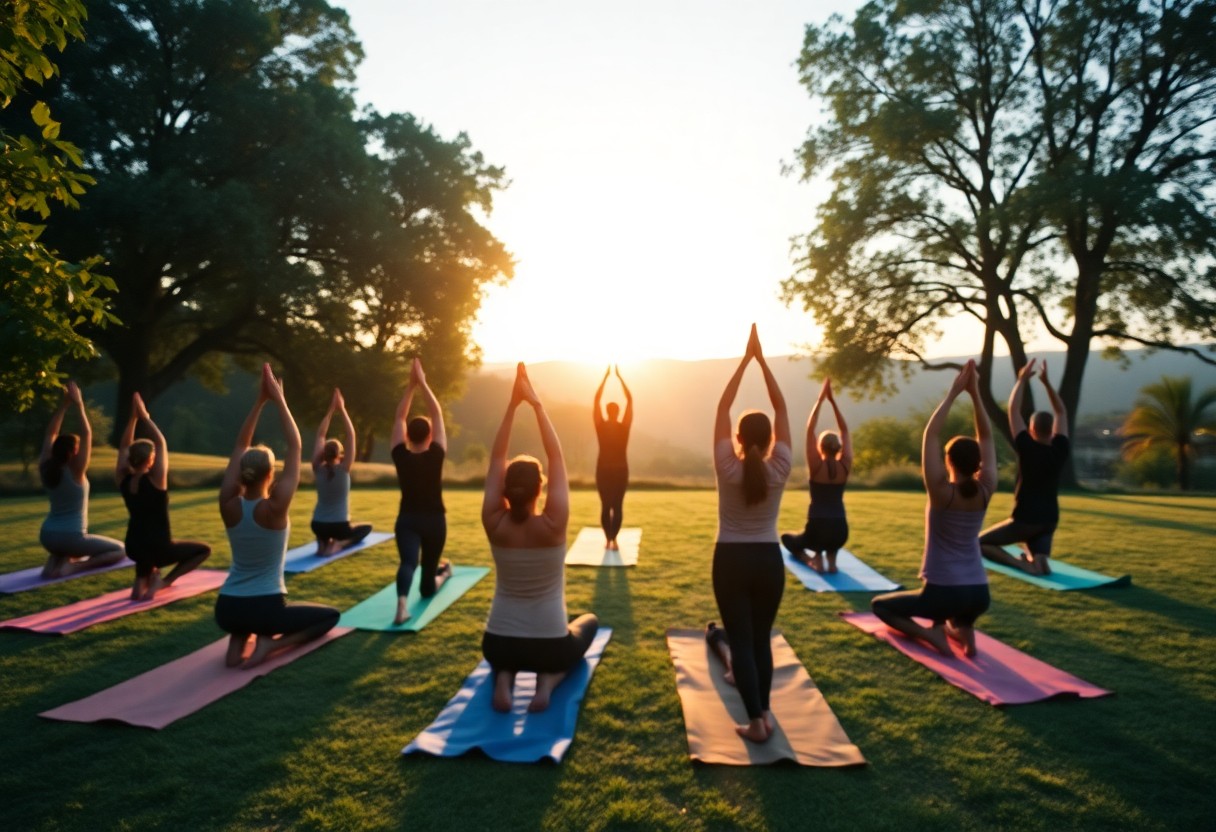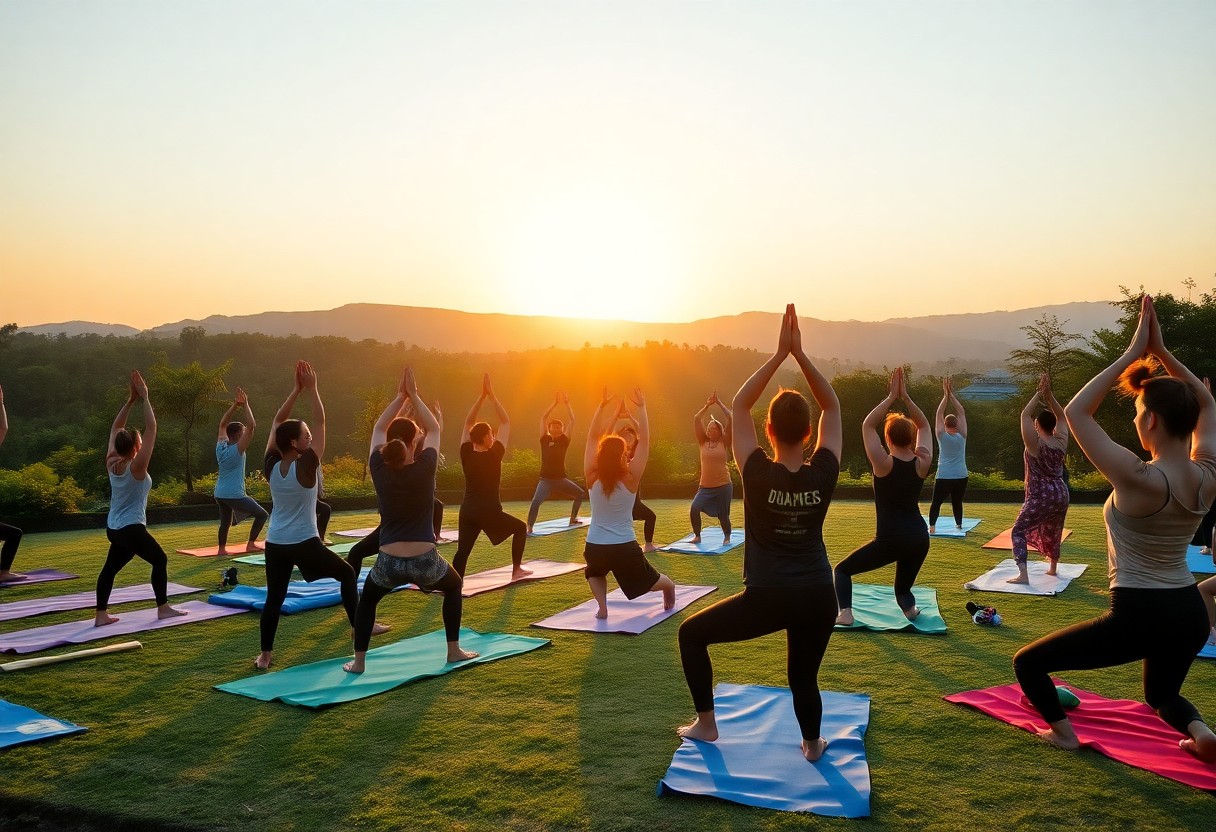International Day of Yoga
As you launch on a journey to enhance your well-being, you’ll discover the significance of mindfulness and physical balance on the International Day of Yoga. You’ll learn how regular practice can help you mitigate stress and anxiety, leading to a more harmonious life. By embracing this ancient tradition, you’ll uncover the transformative power of yoga, fostering a deeper connection with your body and mind, and ultimately, improving your overall health.
History
For centuries, yoga has been an integral part of human culture, shaping the way you think, feel, and interact with the world around you. As you research into the history of yoga, you will discover a rich and complex tapestry of traditions, philosophies, and practices that have evolved over time. Your journey through the history of yoga will take you back to ancient India, where the roots of this practice were first planted. As you explore the origins and evolution of yoga, you will gain a deeper understanding of the transformation that has taken place, and how this practice has become an integral part of modern life.
Origins of Yoga
Alike the gentle morning dew that awakens the earth, the concept of yoga slowly began to take shape in the minds of ancient Indian sages. You will find that the earliest recorded evidence of yoga dates back to the Indus Valley Civilization, around 3000 BCE. The word “yoga” itself is derived from the Sanskrit word “yuj,” meaning to unite or join, reflecting the ultimate goal of this practice: to unify the body, mind, and spirit. As you explore the origins of yoga, you will encounter the Vedas, ancient Indian texts that contain the seeds of yogic philosophy and practices. The Upanishads, which are part of the Vedas, provide valuable insights into the nature of the universe and the human condition, laying the groundwork for the development of yoga.
You will discover that the yogic practices of ancient India were deeply rooted in spirituality and were used as a means to attain liberation from the cycle of birth and death. The yogis of old were seekers of truth, and their practices were designed to help them achieve a state of higher consciousness. As you research deeper into the origins of yoga, you will encounter the Yoga Sutras of Patanjali, a foundational text that systematized the practice of yoga and outlined the eight limbs of yoga. This ancient text provides a comprehensive framework for understanding the practice of yoga and its ultimate goal of achieving inner peace and enlightenment.
You will find that the practice of yoga has been influenced by various cultures and traditions throughout history, resulting in a diverse range of styles and approaches. From the tantric practices of ancient India to the physical postures of modern yoga, the evolution of yoga has been shaped by the interactions of different cultures and philosophies. As you explore the origins of yoga, you will gain a deeper appreciation for the rich cultural heritage that underlies this practice, and how it has been adapted and modified over time to suit the needs of different societies and individuals.
Evolution of Yoga
Originating from the same roots as the origins of yoga, the evolution of yoga has been a long and winding journey, shaped by the interactions of different cultures, philosophies, and historical events. You will discover that the practice of yoga has undergone significant transformations over the centuries, influenced by the social, cultural, and economic contexts in which it was practiced. From the meditative practices of ancient India to the physical postures of modern yoga, the evolution of yoga has been marked by a series of adaptations and innovations that have helped to shape the practice into what it is today.
You will find that the evolution of yoga has been characterized by a series of key milestones and turning points, each of which has contributed to the development of this practice. From the influence of Buddhism and Jainism on the development of yoga, to the impact of colonialism and globalization on the spread of yoga around the world, the evolution of yoga has been shaped by a complex array of historical and cultural factors. As you explore the evolution of yoga, you will gain a deeper understanding of the dynamic and adaptive nature of this practice, and how it has been able to thrive and evolve in response to changing circumstances.
You will discover that the evolution of yoga has also been marked by a series of challenges and controversies, including the commercialization of yoga and the cultural appropriation of yogic practices. As you explore the evolution of yoga, you will be forced to confront the complexities and paradoxes of this practice, and to consider the ways in which it can be used to promote physical, mental, and spiritual well-being, while also respecting the cultural heritage and traditions from which it originates.
At the heart of the evolution of yoga lies a deep-seated desire for transformation and self-improvement, a desire that has driven yogis and yoga practitioners throughout history to explore new practices, techniques, and philosophies. You will find that the evolution of yoga is an ongoing process, shaped by the interactions of different cultures, traditions, and historical events, and that it continues to adapt and evolve in response to the changing needs and circumstances of modern life. As you explore the evolution of yoga, you will gain a deeper understanding of the dynamic and transformative nature of this practice, and how it can be used to promote positive change and personal growth in your own life.
Significance
The International Day of Yoga is a celebration that holds great importance for you, as it encompasses a wide range of benefits that can enhance your overall well-being. As you probe into the world of yoga, you will discover that it is not just a physical practice, but a holistic approach to life that can transform your body, mind, and spirit. You will find that yoga is a journey that takes you deeper into yourself, allowing you to connect with your inner self and discover new aspects of your being. As you practice yoga, you will begin to notice significant changes in your physical, mental, and emotional health, leading to a more balanced and harmonious life.
Spiritual Significance
Approximately, you will find that the spiritual significance of yoga is rooted in its ability to connect you with your inner self and the universe. As you practice yoga, you will begin to experience a sense of unity and oneness with all living beings, transcending the boundaries of the physical world. You will discover that yoga is a powerful tool for spiritual growth, allowing you to quiet your mind, focus on your breath, and access higher states of consciousness. As you probe deeper into the spiritual aspects of yoga, you will find that it offers a profound sense of peace and inner calm, allowing you to navigate life’s challenges with greater ease and clarity. You will also develop a greater sense of self-awareness, enabling you to make more informed choices and live a more authentic life. Furthermore, you will find that the spiritual practice of yoga fosters a sense of compassion and empathy, allowing you to connect with others on a deeper level and cultivate more meaningful relationships.
As you continue on your yoga journey, you will discover that the spiritual significance of yoga is deeply rooted in its ability to transform your perception of reality. You will begin to see the world in a new light, as a complex web of interconnected relationships and energies. You will develop a greater appreciation for the beauty and wonder of life, and find that yoga allows you to access higher states of consciousness, where you can experience a sense of timelessness and spacelessness. You will also find that the spiritual practice of yoga offers a sense of liberation, freeing you from the limitations and conditioning of the mind, and allowing you to unlock your full potential. Moreover, you will discover that yoga provides a framework for personal growth and transformation, enabling you to navigate life’s challenges with greater ease, clarity, and purpose.
In addition to its spiritual benefits, you will find that yoga also offers a profound sense of connection to nature and the universe. As you practice yoga, you will begin to appreciate the beauty and wonder of the natural world, and develop a deeper sense of respect and reverence for the land, the elements, and all living beings. You will also find that yoga fosters a sense of community and connection, allowing you to connect with like-minded individuals who share your values and passions. Furthermore, you will discover that the spiritual practice of yoga offers a sense of purpose and meaning, enabling you to live a more authentic, meaningful, and fulfilling life.
Physical Significance
Alongside its spiritual benefits, you will find that yoga also has a profound impact on your physical health and well-being. As you practice yoga, you will begin to notice significant improvements in your flexibility, balance, and strength, as well as a reduction in stress and anxiety. You will discover that yoga is a powerful tool for physical transformation, allowing you to tone and sculpt your body, improve your posture, and enhance your overall physical fitness. You will also find that yoga offers a range of physical benefits, including improved circulation, reduced inflammation, and a stronger immune system. Moreover, you will discover that yoga provides a holistic approach to physical health, addressing the interconnectedness of the body, mind, and spirit, and offering a more sustainable and long-term approach to wellness.
As you continue to practice yoga, you will find that it has a profound impact on your physical health, allowing you to manage chronic pain, improve your sleep, and enhance your overall quality of life. You will discover that yoga is a powerful tool for physical healing, offering a range of therapeutic benefits, including reduced symptoms of anxiety and depression, improved cardiovascular health, and a reduced risk of chronic disease. You will also find that yoga provides a sense of empowerment, enabling you to take control of your physical health and well-being, and make more informed choices about your body and your life. Furthermore, you will discover that the physical practice of yoga offers a sense of challenge and progression, allowing you to push yourself beyond your perceived limits, and achieve new levels of physical fitness and abilities.
Along with its many physical benefits, you will find that yoga also offers a range of mental and emotional benefits, including reduced stress and anxiety, improved mood, and a greater sense of calm and well-being. You will discover that yoga is a powerful tool for mental and emotional transformation, allowing you to manage your emotions, develop greater self-awareness, and cultivate a more positive and resilient mindset. You will also find that yoga provides a sense of clarity and focus, enabling you to navigate life’s challenges with greater ease and purpose, and achieve your goals and aspirations. Moreover, you will discover that the physical practice of yoga offers a sense of joy and fulfillment, allowing you to connect with your body and your inner self, and experience a sense of wholeness and integration.
Another aspect of the physical significance of yoga is its ability to prevent injuries and improve overall physical function. You will find that yoga helps to increase flexibility and range of motion, reducing the risk of injury and improving overall physical performance. You will also discover that yoga enhances athletic performance, allowing you to run faster, jump higher, and perform at a higher level. Furthermore, you will find that the physical practice of yoga offers a sense of confidence and self-trust, enabling you to push yourself beyond your perceived limits, and achieve new levels of physical fitness and abilities. As you continue to practice yoga, you will experience a sense of transformation and growth, and develop a deeper appreciation for the many benefits of yoga, including its ability to transform your body, mind, and spirit.
Celebration
If you are someone who values the ancient practice of yoga, you might be interested to know how it is celebrated around the world. The International Day of Yoga is a global event that aims to unite people from different cultures and backgrounds through the practice of yoga. As you begin on this journey, you will discover that the celebrations are a vibrant tapestry of music, dance, and meditation. You will have the opportunity to explore different yoga styles, from Hatha to Vinyasa, and learn from experienced instructors who will guide you through the various poses and breathing techniques.
Global Celebrations
Following the success of previous years, the International Day of Yoga has become a beloved tradition for many people around the world. After the sun rises on the summer solstice, you can join thousands of yogis in cities like New York, London, and Tokyo, who will gather in parks and public spaces to practice yoga together. As you participate in these global celebrations, you will be connected to a larger community of like-minded individuals who share your passion for yoga. You will have the chance to experience the diversity of yoga and learn about its rich history and philosophy. Whether you are a seasoned practitioner or a beginner, you will feel welcome and included in these celebrations.
As you explore deeper into the world of yoga, you will discover that the global celebrations are not just about the physical practice, but also about promoting peace and harmony. You will be inspired by the stories of people who have transformed their lives through yoga and will have the opportunity to share your own experiences with others. The global celebrations will also highlight the benefits of yoga for both physical and mental health, and you will learn about the latest research on the subject. You will be amazed by the variety of yoga styles and techniques that will be showcased during the celebrations, and you will have the chance to try new things and challenge yourself.
In the midst of these global celebrations, you will find that the atmosphere is electric and uplifting. As you practice yoga with others, you will feel a sense of camaraderie and connection that is hard to find in everyday life. You will be inspired by the beauty and diversity of the yoga community and will feel grateful to be a part of it. The global celebrations will also raise awareness about the importance of yoga in today’s fast-paced world and will encourage you to make yoga a part of your daily routine.
Cultural Events
Culturally, the International Day of Yoga is a celebration of the human spirit. Culturally, you will find that the events are a rich and vibrant expression of the diversity of yoga. As you participate in the cultural events, you will be immersed in a world of music, dance, and art that will delight and inspire you. You will have the opportunity to learn about the history and philosophy of yoga and will be introduced to new and exciting yoga styles. The cultural events will also showcase the local culture and will give you a taste of the unique traditions of each region.
As you explore the cultural events, you will discover that they are a testament to the power of yoga to bring people together. Culturally, you will find that the events are a beautiful blend of tradition and innovation, with ancient practices being reinterpreted in new and exciting ways. You will be fascinated by the stories of the yoga masters and will be inspired by their wisdom and dedication. The cultural events will also highlight the importance of yoga in promoting physical, mental, and emotional well-being and will encourage you to adopt a healthier lifestyle.
Culturally, the International Day of Yoga is a journey of self-discovery. Culturally, you will find that the events are a rich and rewarding experience that will challenge and transform you. As you participate in the cultural events, you will be exposed to new ideas and perspectives that will broaden your understanding of yoga and its many benefits. You will have the opportunity to meet like-minded people and will be part of a community that shares your passion for yoga. The cultural events will also celebrate the achievements of yoga practitioners and will inspire you to reach new heights.
But as you explore deeper into the world of yoga, you will discover that the cultural events are not without their challenges. You will encounter obstacles such as injuries and self-doubt, but you will also learn to overcome them through the practice of yoga. You will develop greater self-awareness and will cultivate a sense of inner peace that will stay with you long after the celebrations are over. The cultural events will also highlight the importance of sustainability and will encourage you to adopt eco-friendly practices that will reduce your impact on the environment. As you participate in the cultural events, you will be part of a global movement that is working towards a more peaceful and harmonious world, and you will be inspired to make a positive difference in your own community.

Benefits
Keep in mind that yoga is a practice that offers a multitude of advantages for your overall well-being. As you launch on this journey, you will discover that yoga has a profound impact on both your physical and mental health. Regular practice can lead to increased flexibility, balance, and strength, allowing you to move with greater ease and confidence. Moreover, yoga has been shown to improve cardiovascular health, lower blood pressure, and boost your immune system, making it an excellent addition to your wellness routine. As you explore deeper into the world of yoga, you will find that it has the potential to transform your body and mind in profound ways.
Physical Benefits
Beneath the surface of physical postures, yoga also has a profound impact on your internal systems. Your circulatory, nervous, and digestive systems will function more efficiently, leading to improved overall health and well-being. As you practice yoga, you will notice increased energy levels, improved mood, and a heightened sense of vitality. Your body will become more attuned to its natural rhythms and cycles, allowing you to feel more grounded and connected to your physical form. You will discover that your body is capable of healing and transforming itself through the practice of yoga.
Behind the physical benefits of yoga lies a deeper understanding of the intricate web of relationships between your body, mind, and spirit. As you practice yoga, you will come to appreciate the interconnectedness of your physical, mental, and emotional bodies. You will learn to listen to your body’s subtle cues and honor its wisdom, allowing you to navigate life’s challenges with greater ease and confidence. Your body will become a vehicle for self-expression and personal growth, enabling you to live a more authentic and fulfilling life. You will find that your body is a powerful tool for transformation and self-discovery.
Mental Benefits
Mindfully, you will approach the practice of yoga with an awareness of its profound impact on your mental well-being. As you engage in regular practice, you will notice reductions in stress and anxiety, improved mood, and enhanced cognitive function. Your mind will become more clear and focused, allowing you to navigate life’s challenges with greater ease and clarity. Furthermore, yoga has been shown to improve emotional regulation, increase self-awareness, and foster a sense of compassion and empathy, making it an excellent practice for individuals seeking personal growth and development. You will find that your mind becomes more resilient and better equipped to handle the demands of modern life.
Mentally, you will approach life’s challenges with a greater sense of calm and clarity. Your mind will become more discerning and able to distinguish between thoughts, emotions, and intuition. You will learn to observe your thoughts and emotions without becoming attached or identified with them, allowing you to respond to situations more thoughtfully and intentionally. Your mind will become a powerful tool for personal growth and transformation, enabling you to live a more authentic and fulfilling life. You will discover that your mind is capable of profound insight and understanding.
More mindfully, you will approach the practice of yoga with an awareness of its potential to transform your relationship with yourself and the world around you. As you practice yoga, you will come to appreciate the beauty and complexity of the human experience. You will learn to cultivate a sense of gratitude, compassion, and wonder, allowing you to navigate life’s challenges with greater ease and confidence. Your mind will become a gateway to deeper understanding and connection, enabling you to live a more meaningful and purposeful life. You will find that your mind is a powerful instrument for personal growth and self-discovery.
Indeed, the mental benefits of yoga are numerous and profound. As you practice yoga, you will experience increased self-awareness, improved emotional regulation, and enhanced cognitive function. You will learn to navigate the complexities of your mind with greater ease and confidence, allowing you to live a more authentic and fulfilling life. Your mind will become a source of wisdom, guidance, and inspiration, enabling you to make more informed decisions and live a more purposeful life. You will discover that your mind is capable of profound transformation and growth, and that yoga is a powerful tool for unlocking its full potential.
Practices
Once again, as you commence on this journey of exploring the world of yoga on International Day of Yoga, you will discover a vast array of practices that have been nurtured and refined over centuries. Your exploration will lead you to probe into the traditional and modern adaptations of yoga, each with its unique characteristics and benefits. As you probe deeper, you will find that these practices are not just physical postures, but a holistic approach to unifying your body, mind, and spirit. You will encounter various styles, each with its own set of principles and techniques, designed to suit different needs and preferences.
Traditional Practices
Above all, the traditional practices of yoga are rooted in ancient Indian philosophy, emphasizing the union of physical, mental, and spiritual disciplines. You will find that these practices are deeply rooted in the concept of balance and harmony, aiming to bring equilibrium to your entire being. As you practice traditional yoga, you will be introduced to various asanas (postures), pranayama (breathing techniques), and meditation practices that have been passed down through generations. These practices are designed to help you cultivate physical flexibility, mental clarity, and emotional stability, ultimately leading to a state of inner peace and self-awareness. You will also encounter the concept of yamas and niyamas, which are ethical guidelines for living a virtuous and compassionate life.
As you explore traditional yoga practices, you will discover the significance of Hatha Yoga, which focuses on physical postures and breathing techniques to balance your energies. You will also learn about Raja Yoga, which emphasizes the practice of meditation and self-reflection to attain spiritual growth. Furthermore, you will encounter Bhakti Yoga, which cultivates devotion and love as a means to connect with the divine. These traditional practices will guide you toward a deeper understanding of yourself and the world around you, allowing you to experience a sense of unity and interconnectedness.
You will find that traditional yoga practices are often taught in a more structured and disciplined manner, with an emphasis on proper alignment, breathing, and relaxation techniques. As you practice these traditional methods, you will be encouraged to adopt a healthy and balanced lifestyle, including a wholesome diet and regular exercise. By embracing these traditional practices, you will be able to experience the profound benefits of yoga, including reduced stress, improved flexibility, and enhanced overall well-being. As you immerse yourself in these ancient practices, you will develop a greater appreciation for the rich cultural heritage of yoga and its timeless wisdom.
Modern Adaptations
Among the various modern adaptations of yoga, you will find a diverse range of styles and approaches that cater to different needs and preferences. You will discover Vinyasa Yoga, which links movement with breath, creating a dynamic and flowing practice. You will also encounter Ashtanga Yoga, which involves a set sequence of postures, designed to build internal heat and purify the body. Furthermore, you will learn about Iyengar Yoga, which emphasizes the use of props and precise alignment to develop strength, flexibility, and balance. These modern adaptations of yoga offer a more accessible and inclusive approach, allowing you to practice yoga in a way that suits your unique needs and abilities.
As you explore modern yoga adaptations, you will find that they often incorporate new techniques and innovative approaches, such as yoga with weights, aerial yoga, or yoga with music. You will also encounter specialized classes, such as yoga for beginners, yoga for pregnancy, or yoga for stress relief, which cater to specific needs and populations. These modern adaptations of yoga are designed to be more engaging and enjoyable, making it easier for you to stick to your practice and experience the numerous benefits of yoga. You will also appreciate the community aspect of modern yoga, which often involves practicing with others, sharing experiences, and supporting one another in your journey.
You will discover that modern yoga adaptations often blend traditional principles with contemporary approaches, creating a unique and evolutionary practice. As you practice these modern adaptations, you will be encouraged to listen to your body, honor your limitations, and push past your boundaries in a safe and supportive environment. With the guidance of experienced instructors and the camaraderie of like-minded individuals, you will be able to deepen your practice, challenge yourself, and celebrate your accomplishments.
With the plethora of modern yoga adaptations available, you will have the opportunity to experiment and find the style that resonates with you the most. You will be able to tailor your practice to your unique needs, goals, and preferences, ensuring that your yoga journey is both rewarding and sustainable. As you navigate the world of modern yoga, you will encounter inspiring stories of transformation, witness remarkable progress, and experience the profound impact of yoga on your physical, mental, and emotional well-being.
Education
Despite the growing popularity of yoga, many people are still unaware of its rich history and philosophical roots. As you explore into the world of yoga, you will discover that it is not just a physical practice, but a holistic approach to life that encompasses the body, mind, and spirit. Your journey into yoga education will be a transformative one, as you explore the various aspects of this ancient practice. You will learn about the different branches of yoga, including Hatha Yoga, Kundalini Yoga, and Bhakti Yoga, each with its unique approach and focus.
As you begin on this educational journey, you will encounter various aspects of yogic philosophy, which will deepen your understanding of this ancient practice.
Yogic Philosophy
Educating yourself about yogic philosophy will be a fascinating experience, as you explore the fundamental principles of yoga, including the concept of non-dualism and the nature of the self. You will learn about the Eight Limbs of Yoga, which provide a framework for living a meaningful and purposeful life. Your studies will also introduce you to the concept of koshas, or the layers of the human being, which will help you understand the interconnectedness of the physical, mental, and spiritual bodies. As you explore deeper into yogic philosophy, you will encounter the teachings of Patanjali, who is considered the father of yoga, and his seminal work, the Yoga Sutras.
You will also explore the concept of ahimsa, or non-violence, which is a fundamental principle of yoga, and learn how to apply it to your daily life. Your education in yogic philosophy will be a thought-provoking experience, as you confront the limitations of your own understanding and challenge your assumptions about the nature of reality. As you progress on this journey, you will develop a deeper appreciation for the timeless wisdom of yogic philosophy, and its universal applicability to modern life. You will learn to approach life with a sense of curiosity and wonder, and to cultivate a deeper sense of awareness and understanding of yourself and the world around you.
Your exploration of yogic philosophy will also introduce you to the concept of dukha, or suffering, and the ways in which yoga can help to alleviate it. You will learn about the four noble truths, which provide a framework for understanding the nature of suffering and the path to liberation. As you explore deeper into the teachings of yoga, you will encounter the concept of mindfulness, and learn how to cultivate a greater sense of presence and awareness in your daily life. Your education in yogic philosophy will be a transformative experience, as you develop a deeper understanding of yourself and the world around you, and learn to approach life with a sense of equanimity and compassion.
Teaching Methods
Around the topic of teaching methods, you will discover that there are various approaches to sharing the knowledge of yoga with others. About the time you start learning, you will realize the importance of finding a qualified teacher who can guide you on your journey. You will learn about the different teaching styles, including the traditional approach, which emphasizes the transmission of knowledge from teacher to student, and the contemporary approach, which incorporates modern methods and techniques. Your education in teaching methods will also introduce you to the concept of sequencing, which involves the art of creating a yoga practice that is tailored to the needs of the individual or group.
About the process of learning, you will find that teaching methods are constantly evolving, as new techniques and approaches are developed. You will learn about the importance of create a safe and supportive environment for your students, and the need to be adaptable and responsive to their needs. Your education in teaching methods will also emphasize the importance of ongoing learning, as you continue to develop your skills and knowledge as a teacher. As you progress on this journey, you will develop a deeper understanding of the art of teaching, and learn to approach your students with a sense of empathy and compassion.
Around the idea of sharing knowledge, you will discover that teaching yoga is not just about conveying information, but about creating a transformative experience for your students. You will learn about the power of storytelling in teaching yoga, and the importance of using metaphors and analogies to convey complex concepts. Your education in teaching methods will also introduce you to the concept of embodied cognition, which emphasizes the importance of experiential learning and hands-on experience. As you explore deeper into the world of teaching yoga, you will develop a deeper appreciation for the art of communication, and learn to approach your students with a sense of clarity and precision.
Indeed, as you explore the various teaching methods, you will come to realize that the most effective approach is one that is tailored to the needs of the individual or group. You will learn to adapt your teaching style to meet the unique needs of your students, and to create a sense of community and connection in your classes. Your education in teaching methods will be a transformative experience, as you develop the skills and knowledge necessary to become a compassionate and effective yoga teacher.
To wrap up
Drawing together the threads of our discussion on the International Day of Yoga, you begin to see the profound impact that this ancient practice has on your life and the world at large. As you celebrate this day, you are not just honoring a tradition, but also cultivating a sense of unity and shared human experience. You are part of a global community that comes together to acknowledge the transformative power of yoga, and in doing so, you are reminded of your own capacity for growth, self-awareness, and compassion. As you examine deeper into the practice, you start to appreciate the intricate web of physical, mental, and spiritual benefits that yoga offers, and how it can be a powerful tool for personal evolution and social change.
As you reflect on the significance of the International Day of Yoga, you may find yourself pondering the ways in which this practice can be a catalyst for positive change in your own life and in the world. You may consider how yoga can help you develop greater mindfulness, clarity, and purpose, and how these qualities can, in turn, inspire you to make more conscious choices that align with your values and promote the well-being of those around you. You may also think about the ways in which yoga can be a unifying force, bringing people together across cultures, borders, and backgrounds, and fostering a sense of global citizenship and cooperation. As you contemplate these possibilities, you begin to see the International Day of Yoga as more than just a celebration – it is an invitation to initiate on a journey of self-discovery, personal growth, and collective transformation.
As you look to the future, you can envision a world where the principles of yoga – such as ahimsa, or non-violence, and satya, or truthfulness – become guiding forces in your daily life and in the world at large. You can imagine a world where people from all walks of life come together to practice yoga, share their experiences, and learn from one another, and where this collective energy inspires a new era of peace, understanding, and harmony. And as you stand in this vision, you realize that the International Day of Yoga is not just a fleeting celebration, but a catalyst for a deeper, more profound shift in your own consciousness and in the consciousness of humanity. You see that, through yoga, you have the power to shape your own destiny and contribute to the creation of a more just, compassionate, and enlightened world – a world that reflects the highest potential of the human spirit, and where you can thrive as a unique and invaluable expression of the universe.
FAQ
Q: What is the International Day of Yoga and why is it celebrated?
A: The International Day of Yoga is a global event celebrated on June 21st every year. It was declared by the United Nations General Assembly in 2014 to raise awareness about the benefits of yoga and its importance in our daily lives. The day is celebrated to promote physical, mental, and spiritual well-being, and to highlight the role of yoga in achieving a healthy and balanced lifestyle.
Q: What are the benefits of practicing yoga on the International Day of Yoga?
A: Practicing yoga on the International Day of Yoga can have numerous benefits, including reduced stress and anxiety, improved flexibility and balance, and enhanced overall physical and mental health. It can also help to increase self-awareness, boost mood, and improve concentration and focus. Additionally, participating in yoga events on this day can provide an opportunity to connect with like-minded people and be part of a global community that values wellness and self-care.
Q: How can I participate in the International Day of Yoga and make it a part of my regular routine?
A: You can participate in the International Day of Yoga by joining local yoga events, classes, or workshops, or by practicing yoga at home with family and friends. Many yoga studios, gyms, and community centers offer free or low-cost yoga classes on this day. You can also follow online yoga tutorials or join virtual yoga events to participate. To make yoga a part of your regular routine, start by setting aside a few minutes each day to practice simple yoga poses, breathing techniques, or meditation. You can also incorporate yoga into your daily schedule by replacing one of your daily activities with a yoga practice, such as replacing your morning coffee with a morning yoga routine.
![]()













